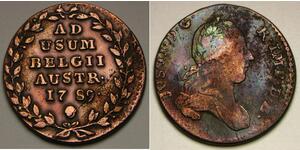(Vendida por $220.0)
1722, Brunswick-Luneburg-Calenberg-Hannover, George I. Silver Mining Thaler Coin.
He was both Duke of Hanover and King of England. Rare!
Mint Year: 1722
Mint Place: Clausthal
Condition: A nice VF-XF!
Reference: Davenport 2075, KM-133.2. RR!
Mint Master: Heinrich Christian Bonhorst (HCB)
Denomination: Thaler - St. Andreas Silver Mining issue!
Weight: 28.98gm
Diameter: 41mm
Material: Silver
Obverse: Togate and nimbate Saint Andrew carrying X-shaped cross. Mint master`s initials (H.C.B.) in exergue.
Legend: BRVNS . ET . LVN . DVX . S . R . L . A . THES . ET . EL .
Reverse: British royal crown ontop of arms of the House of Hannover within Order of the Garter, supported by lion and unicorn. Banner below.
Order of the Garter Inscription: HONI SOIT QUI MAL Y PNESE ("Ashamed be he who thinks bad about it!").
Banner incription: DEIU ET MON DROIT ("Meaning God and my right!")
Legend: GEORGIUS . D . G . M . BRIT . FR . ET . THIB . REX . F . D. - 17 -22 .
The Most Noble Order of the Garter is an order of chivalry, or knighthood, originating in medieval England. The Order is dedicated to the image and arms of St. George as England's Patron Saint, and is presently bestowed on recipients from British and other realms; it is the pinnacle of the honours system in the United Kingdom. Membership in the order is limited to the sovereign, the Prince of Wales, and no more than twenty-four members, or Companions; the order also comprises Supernumerary knights and ladies (e.g., members of the British Royal Family and foreign monarchs). Bestowing the honour has been described as one of the Monarch's few remaining truly personal, executive prerogatives.
Dieu et mon droit (meaning God and my right) is the motto of the British Monarch in England. It appears on a scroll beneath the shield of the English version of the coat of arms of the United Kingdom. The motto refers to the divine right of the Monarch to govern and is said to have first been used by King Richard the Lionheart as a battle cry and official motto of battle, then adopted as the royal motto of England by King Henry V in the 15th century.
Saint Andrew ( Andreas; early 1st century—mid to late 1st century AD), called in the Orthodox tradition Protokletos, or the First-called, is a Christian Apostle and the brother of Saint Peter. The name "Andrew" (Greek: manly, brave, from ??d?e?a, Andreia, "manhood, valour"), like other Greek names, appears to have been common among the Jews from the 3rd or 2nd century BC. No Hebrew or Aramaic name is recorded for him. He is considered the founder and first bishop of the Church of Byzantium and is consequently the patron saint of the Ecumenical Patriarchate of Constantinople.
George I (George Louis; German: Georg Ludwig; 28 May 1660 – 11 June 1727) was King of Great Britain and Ireland from 1 August 1714 until his death, and ruler of the Duchy and Electorate of Brunswick-Lüneburg (Hanover) in the Holy Roman Empire from 1698.
George was born in Hanover, in what is now Germany, and inherited the titles and lands of the Duchy of Brunswick-Lüneburg from his father and uncles. A succession of European wars expanded his German domains during his lifetime, and in 1708 he was ratified as prince-elector of Hanover. At the age of 54, after the death of Queen Anne of Great Britain, George ascended the British throne as the first monarch of the House of Hanover. Although over fifty Roman Catholics bore closer blood relationships to Anne, the Act of Settlement 1701 prohibited Catholics from inheriting the British throne. George, however, was Anne's closest living Protestant relative. In reaction, Jacobites attempted to depose George and replace him with Anne's Catholic half-brother, James Francis Edward Stuart, but their attempts failed.
During George's reign, the powers of the monarchy diminished and Britain began a transition to the modern system of cabinet government led by a prime minister. Towards the end of his reign, actual power was held by Sir Robert Walpole, Britain's first de facto prime minister. George died on a trip to his native Hanover, where he was buried.
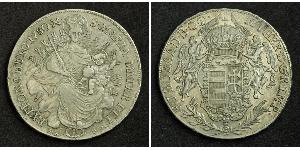
1 Thaler Reino de Hungría (1000-1918) Pl ...
grupo tiene 39 monedas / 38 precios
Add coin to this group

1 Thaler Salzburgo Plata Hieronymus von ...
grupo tiene 11 monedas / 11 precios
Add coin to this group
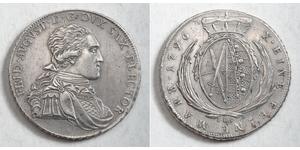
1 Thaler Electorado de Sajonia (1356 - 1 ...
grupo tiene 54 monedas / 52 precios
Add coin to this group
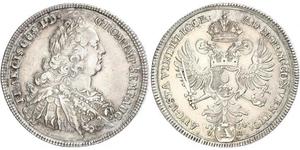
1 Thaler Sacro Imperio Romano (962-1806) ...
grupo tiene 8 monedas / 8 precios
Add coin to this group

5 Cent Sri Lanka Cobre Victoria (1819 - 1901)
grupo tiene 7 monedas / 7 precios
Add coin to this group

1/2 Thaler Imperio austríaco (1804-1867) ...
grupo tiene 5 monedas / 3 precios
Add coin to this group

8 Escudo Virreinato de Nueva Granada (17 ...
grupo tiene 18 monedas / 17 precios
Add coin to this group
1 Pound Irlanda (1922 - ) Plata
grupo tiene 6 monedas / 6 precios
⇑
2 Liard Países Bajos Austríacos (1713-1795) Cobre
grupo tiene 4 monedas / 4 precios
⇑

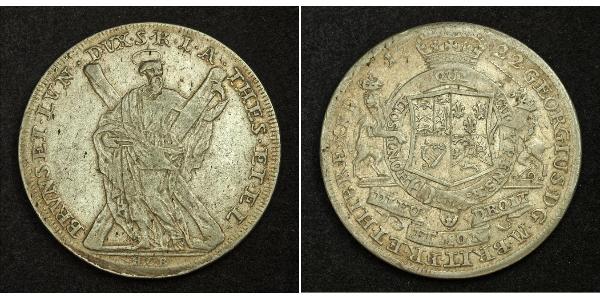






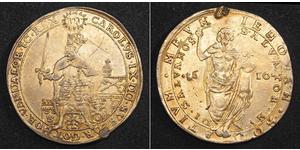
-300-150-IdLBwcI0cU8AAAEqizBDRaSY.jpg)
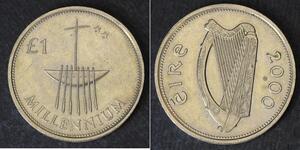
-300-150-N7QKX9ISGfEAAAFX9awaL_VH.jpg)
